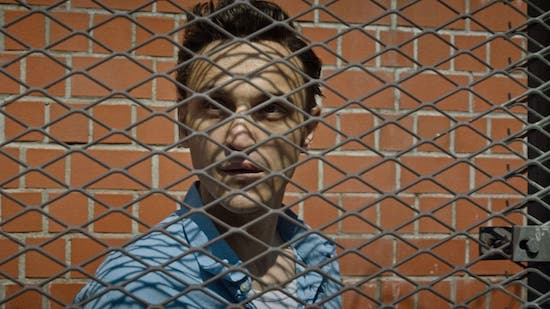When I sit down with Franz Rogowski at the Locarno Film Festival in August 2021, it’s the second of three major festivals attended by the prolific actor, representing three different films, that summer. Cannes played host to Sebastian Meise’s Great Freedom, streaming on MUBI from this week in the UK, in which Rogowski plays a man repeatedly imprisoned for being gay in post-Second World War Germany, and two less high-profile titles, Luzifer and Freaks Out, followed at Locarno and Venice respectively. Rogowski has become a trusted arthouse mainstay over the last several years since his turn in Sebastian Schipper’s 2015 one-take thriller Victoria, a role that propelled his career forward into the arms of some of the industry’s finest directors – Terence Malick, Angela Schanelec and Christian Petzold, to name a few.
Arriving fresh from a dip in Lago Maggiore, Rogowski exudes calm, a guardedly cool figure with the undeniable elusiveness that permeates many of his characters. With his gentle demeanour, Rogowski is aware of the persona he has built; he offers reliably sensitive and grounded performances as people who always seem to be hiding something, an inner turmoil or wounded vulnerability. “We live in times that create a certain desire for authenticity,” the actor says. “And I know that I have certain features that create certain tensions or questions, and I’m selling those features.” These features – compassionate eyes, a memorable cleft lip scar (he’s well aware this makes people associate him with Joaquin Phoenix, an actor he finds “inspiring”), a controlled fluidity in movement – make him a subtly transformative presence on screen. Perhaps his best work has been in Petzold’s films Transit and Undine, showcasing his magnetic quality as a more subdued leading man.
His approach is fundamentally professional, foregrounding collaboration over individual development of character. “I learn my lines, and I try to get in shape, whatever that shape is, and, at the end of the day, I don’t really know what to do until we start shooting,” he says. “I prepare a little bit, but I think I’m the type of actor that needs security with the actions and lines and the story. I think it’s often wise to not take it all and be a character for yourself, but rather create a landscape that can be combined with music, with editing, with your colleagues. Their interactions shape your character’s choices, and your character’s emotions. Being driven by silence or by music can be much more interesting than being a method actor, feeling it all and being super self-centred and intense. ”
“I think depending on a director’s signature move, I try to fit in and find my choreography within that style,” he adds. “Sometimes it’s very surprising. Sometimes you need to really defend a character, sometimes you just have to let go of the character and just be there and know your line.” This is especially true of his work with Petzold, he explains, who he describes, with kindness, as “passive aggressive” on set. “He just wants you to do what you’re supposed to do. And he’s very supportive and friendly, but he doesn’t want you to be creative. He wants the character to be a person saying lines in a fictional construction. So I think for him, it’s always interesting to have this dimension of an actor saying a line and not an actor trying to really be a fictional character.”
Great Freedom sees Rogowski undergo a more physical transformation for the first time in his career, but Hans still feels in keeping with the actor’s catalogue of tormented men. “I think the biggest challenge was losing weight for different periods of time,” he says. “So I had a – it sounds very American – diet to go on. Of course, the emotional background is also very different, with homosexual men oppressed by a government and structural violence.” His physical evolution over the course of the film, which flits between various spells in prison from 1945 to 1968, is a brilliant corporeal manifestation of the oppression and trauma he refers to. His efficacy as an actor is often seen in the softness of his expression, a bruised heart emerging behind a warm façade, but it is apparent as much in the way he walks or the way he rests his hands. “I must admit that I like to find abstract translations of emotions into action,” Rogowski says. “If I can find a walk through a space that tells you something about the inner life of a person or a look, that’s great. If it’s not too selfish and arrogant to say that I know how my fictional character feels, I can find a landscape that tells something about that fiction. I’m trying to find that choreography.”
Rogowski continues to refer to his practice as “choreography,” a lingering impact of his experience in contemporary dance and theatre circles in Germany at the start of his career. It’s this blend of a considered construction in movement and the ability to find an inner openness that constitutes his craft. “I feel often the biggest work is to actually disconnect yourself from all the stress and live in a little bubble where you’re just sheltering all your channels,” he says. “And then when you hear your name, you know now it’s time to be open and you’re fully present. In the best cases that might create this authenticity. But it’s not authentic in a way that’s natural. It’s very unnatural to be on set and be yourself. When people tell me, ‘You were just yourself,’ it’s funny. It’s actually a lot of work to be yourself.” Who is Franz Rogowski’s true self off-screen, then, and where do his dancer tendencies end? “I hate to dance, to be honest, in my private life,” he says. “I’m the guy at the bar with a beer. And I’d love to be free and dance, but I’m not. I’m German. And it scares me to death to just let go.”


